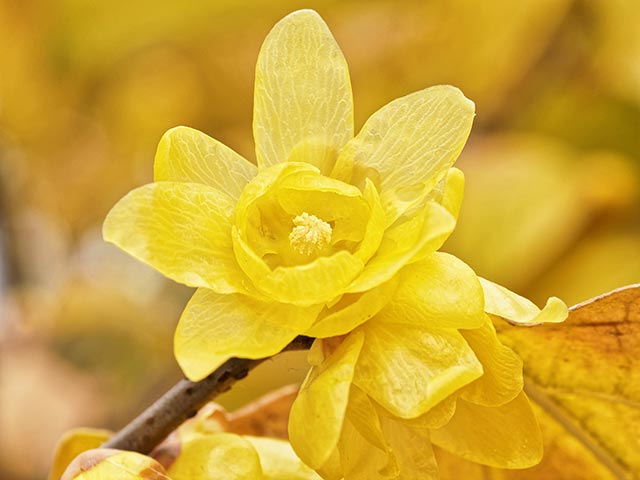
The six species that make up the Chimonanthus genus of flowering plants are commonly prescribed as treatments in folk medicine or turned into healthy beverages and decoctions. A recent meta-analysis by Chinese researchers indicated that these plants – often called wintersweet – contain many natural compounds with various beneficial effects.
Traditional Chinese medicine prescribes many parts of wintersweet for fever, gastrointestinal disorders, headaches, inflammatory problems, respiratory infections, rheumatic arthritis, and serious injuries. Recent research identified an abundance of metabolites – including essential oils – that account for the medicinal plants’ antibacterial, anti-tumor, anti-inflammatory, antioxidant, and anti-hyperglycemic activities.
Earlier pharmacological studies have focused on the extracts of the plants and their medicinal effects on various diseases; however, recent data that targeted individual parts found new properties, such as antioxidant and cancer-inhibiting activities.
Chimonanthus extracts have antimicrobial properties. Their ability to inhibit the growth of Staphylococcus aureus and other harmful bacteria is comparable to the antibiotic drug gentamicin. They also achieve similar inhibitory effects on disease-causing fungi.
The alcohol extracts also display analgesic, antitussive, and expectorant effects. Their chimonanthine compounds bind two different opioid receptors, leading to reduced pain levels, higher pain thresholds, and faster displacement of phlegm based on animal studies. (Related: Flavones in Chinese skullcap can improve bone mineralization.)
100% organic essential oil sets now available for your home and personal care, including Rosemary, Oregano, Eucalyptus, Tea Tree, Clary Sage and more, all 100% organic and laboratory tested for safety. A multitude of uses, from stress reduction to topical first aid. See the complete listing here, and help support this news site.
Chimonanthus has almost too many medicinal properties to count
Animal studies showed that other natural compounds found in wintersweet extracts suppress inflammation. Shanlamei Ganmao tea stopped abdominal capillary permeability and alleviated swollen feet, while a water extract from C. nitens lowered the levels of inflammation-signaling molecules in the lung and blood.
Decoctions made from the flowers and leaves of Chimonanthus can alleviate inflammatory diseases like chronic atrophic gastritis with precancerous lesions, chronic renal failure, and peripheral T-lymphocyte tumors. They also improve normal immune function.
The plant’s extracts also improve the symptoms of adjuvant arthritis and chronic pelvic inflammation. They even outperformed the pharmaceutical drug used to treat the pelvic disease.
The alkaloids in wintersweet have antihypertensive properties and can manage blood pressure levels. Other compounds affect the production of body fat by inhibiting fatty acid synthase and preventing the accumulation of fat.
Extracts derived from the plant decrease the levels of total cholesterol and triglycerides. In addition to reducing fat levels, they also reduced appetites and induced weight loss at the same time.
Wintersweet contains natural antioxidants and other beneficial compounds
Flavonoids and coumarins provide most of the antioxidant capacity in wintersweet plants. These compounds include rutin, isoquercitrin, and quercetin. Tests showed that high concentrations could scavenge more than 90 percent of free radicals that cause oxidative stress.
Chimonanthus extracts can inhibit the activity of acetylcholinesterase, a substance that breaks down acetylcholine and other essential neurotransmitters in the brain. They serve as natural antidepressants by increasing neurotransmitters in the brain that improve mood and behavior. The flavonoids rutin, and kaempferol, and quercetin are believed to play roles in fighting depression.
Wintersweet can serve in antihyperlipidemic and antihyperglycemic roles. The compounds in its extracts reduce the levels of cholesterol and other fats in the blood. They can also normalize blood glucose levels, thereby helping to prevent the onset of insulin resistance and more serious metabolic problems like diabetes.
The analysis indicated that the flower of the C. praecox species contained the highest amount of secondary metabolites among the members of the Chimonanthus genus. C. praecox could be considered the best candidate for large-scale cultivation, harvesting, and extraction of natural antioxidants and other metabolites.
Wintersweet-derived products and decoctions are generally considered to be safe for human consumption. However, the plants do contain high levels of alkaloids, which can be toxic in excessive amounts, so consult with integrative health practitioners first and avoid the alkaloid-rich seeds.
Sources include:
ScienceDirect
CJNMCPU


